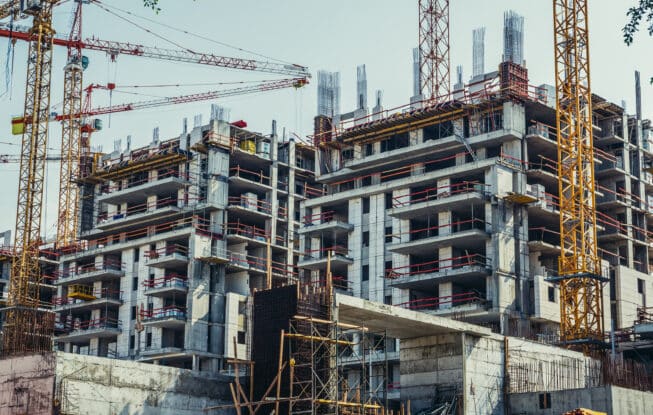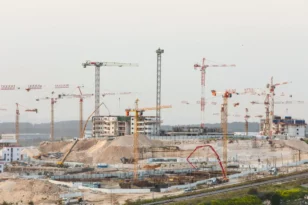Between March and May 2025, just 460 new apartment sales were recorded in Tel Aviv—down from around 950 in the previous three-month period. Nationwide, new apartment sales dropped by 35.5%, while secondhand transactions fell 13.5%. Meanwhile, the number of unsold units reached a record high of 81,000.
By Doron Breitman, Nadlan Center
According to data released by the Central Bureau of Statistics (CBS) on Monday, 6,820 apartments were sold throughout Israel in May. That’s a 3.8% rise from April and a 19.4% drop year-over-year. Of these, 2,430 were new apartments, 26.7% of which were government-subsidized—up 3.1% from the previous month, but down 37.9% from May last year. The other 4,390 units were resales, marking an 8% increase month-over-month and a 3.4% year-over-year decline.
Over the three months from March to May 2025, approximately 21,800 apartments were sold—a 23.4% drop compared to February–April 2025. The decline is largely attributed to a surge in purchases back in December, ahead of the VAT increase to 18%, as well as fewer workdays during the Passover holiday in April. Even compared to the same period last year (March–May 2024), sales were down 12.9%, despite the impact of the October 7, 2023 outbreak of the Iron Swords war.
Of the total number of apartments sold between March-May 2025, around 8,180 were new apartments, a 35.5% drop from December 2024–February 2025. Resales accounted for 62.4% of sales in Q1 2025 (13,620 units), with resales falling 13.6% compared to the previous quarter.
Tel Aviv-Jaffa saw the most significant drop in new apartment sales: from around 950 between December 2024 and February 2025 to just 460 in March–May 2025—over a 50% decline. There was also a drop in resales, although less sharp: from 707 to 613 units.
Ofakim Leads in New Apartment Sales
Regional data shows that the Central district led apartment sales from March to May 2025, accounting for 25.4% of all transactions—29% of new apartment sales (2,375 units) and 23.2% of resales (3,158 units). The Southern district came next with 22.1% of total sales, including 25.2% of new apartments (2,063 units) and 20.3% of resales (2,764 units). The Tel Aviv district made up 15.7% of all sales, with 16.7% of new units (1,364) and 15.1% of resales (2,066).
Compared to the previous quarter, all districts saw declines in new-home sales: Haifa (-48.4%), Tel Aviv (-44%), Jerusalem (-43.6%). Resales also fell everywhere, notably by 21.4% in the Northern district.
A breakdown by municipality shows the southern city of Ofakim leading in new-home sales with 532 units in March–May 2025 (–21.3%). Next came Tel Aviv–Jaffa with 461 (–51.3%), Ashdod 461 (+27.7%), Lod 392 (–53.3%), and Jerusalem 358 (–58.5%).
Haifa led resale transactions with 880 deals (–10% from the prior quarter), followed by Jerusalem with 860 (–16.3%), Be’er Sheva 756 (–17.4%), Tel Aviv 613 (–13.3%), and Petah Tikva 436 (–13%).
81,000 New Units Unsold
The stock of new apartments remaining for sale continues to break records, reaching 80,930 units as of May 2025. The number of months of supply (the estimated time it would take to sell all remaining units) also continues to rise, now standing at 30.1 months. Compared to April 2025, the inventory increased by 1.9%, and compared to the same period last year, it rose by 21.7%. Of the unsold new apartments, 32.3% are located in the Tel Aviv district (26,120 units), and 23.9% are in the Central district (19,350 units).
Among large cities with over 100,000 residents, Tel Aviv–Jaffa leads with 10,140 unsold units, followed by Jerusalem with 7,774, Bat Yam (4,405), Netanya (3,699), and Ramat Gan (3,477). Excluding Israel’s largest cities, the cities with the highest number of unsold new apartments are Be’er Ya’akov (2,230 units), Lod (2,420), Kiryat Ono (1,510), Ra’anana (1,380), Ofakim (1,350), Kiryat Bialik (1,240), Or Yehuda (1,140), and Netivot (1,010).
Roni Brik, President of the Israel Builders Association said: “The crisis in the construction sector is showing up across the board—most visibly in construction timelines, which continue to stretch to record lengths due to a labor shortage the government has yet to resolve. The CBS figures on unsold apartments are misleading, as they include tens of thousands of units where construction hasn’t even started. CBS counts units as ‘for sale’ from the moment a site is fenced off, even if no building work is underway. With no clear timeline for when they’ll have the workers to begin construction, developers are holding off on sales for these projects. There are two other key factors to consider. First, just a few months ago, the CBS itself reported that only 15,000 completed apartments remained unsold—just one-fifth of the current figure. It has since stopped publishing that number. Second, Operation Rising Lion has had a major impact on the market, leaving thousands of families without homes. These families will soon be entering the market—whether to rent or buy. Given all this, the government must act immediately and allow the private sector to bring in 50,000 foreign workers for construction, infrastructure, and renovations—without the involvement of foreign governments, which have become the main barrier to progress. If not, every Israeli will bear the cost in the years ahead.”

Nadlan Center is Israel’s leading real estate news and knowledge platform in Hebrew, created for industry professionals. Founded by experts in the field, it delivers in-depth, up-to-date coverage on urban renewal, planning and construction, taxation, and housing policy — tailored to the needs of developers, investors, planners, and financiers. In addition to its widely read news content, Nadlan Center hosts major industry events, professional conferences, and training programs that support the growth and development of the Israeli real estate sector.
Learn more: https://www.nadlancenter.co.il







